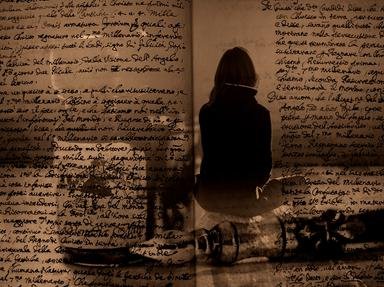Quiz Answer Key and Fun Facts
1. Siegfried Sassoon is, perhaps, the best-known First World War poet. He wrote, in "Counter-Attack", "He crouched and flinched, dizzy with galloping fear,/Sick for escape - loathing the strangled horror/And butchered, frantic gestures of the dead." How did Siegfried Sassoon die?
2. Edward Thomas wrote, in "Cherry Trees", "The cherry trees bend over and are shedding/On the old road where all that passed are dead,/Their petals, strewing the grass as for a wedding/This early May morn where there is none to wed." How did Edward Thomas die?
3. Rudyard Kipling was not just a novelist; he wrote poetry also. In two lines, he sums up his feelings about the war in "Epitaphs of the War - An Only Son": "I have slain none except my Mother. She/(Blessing her slayer) died of grief for me." How did Rudyard Kipling die?
4. Charles Hamilton Sorley wrote the poem "When you see Millions ...": "When you see Millions of the mouthless dead/Across your dreams in pale battalions go,/Say not soft things as other men have said,/That you'll remember. For you need not so." How did Charles Hamilton Sorley die?
5. Ivor Gurney, in "To His Love", wrote these lines: "Cover him, cover him soon!/And with thick-set/Masses of memoried flowers - /Hide that red wet/Thing I must somehow forget." How did Ivor Gurney die?
6. Wilfrid Owen is one of the best-known First World War poets, and deservedly so. In his poem "Mental Cases", he writes "These are men whose minds the Dead have ravished./Memory fingers in their hair of murders,/Multitudinous murders they once witnessed./Wading sloughs of flesh these helpless wander,/Treading blood from lungs that had loved laughter." How did Wilfrid Owen die?
7. Thomas Hardy himself had words to say about World War One. In "Channel Firing" he wrote "That night your great guns, unawares,/Shook all our coffins as we lay,/And broke the chancel window-squares,/We thought it was the Judgment Day/" How did Thomas Hardy die?
8. Julian Grenfell wrote this about WWI in his poem "Into Battle": "The thundering line of battle stands,/And in the air death moans and sings;/But Day shall clasp him with strong hands,/And Night shall fold him with soft wings." How did Julian Grenfell die?
9. Rupert Brooke wrote these lines about WWI in his poem "The Soldier": "If I should die, think only this of me:/That there's some corner of a foreign field/That is forever England." How did Rupert Brooke die?
10. Isaac Rosenberg wrote this about WWI in his poem "Returning, We Hear the Larks": "Sombre the night is./And though we have our lives, we know, What sinister threat lurks there./...But hark! joy-joy-strange joy!/Lo! heights of night ringing with unseen larks./Music showering on our upturned list'ning faces." How did Isaac Rosenberg die?
Source: Author
alliefarrell
This quiz was reviewed by FunTrivia editor
bloomsby before going online.
Any errors found in FunTrivia content are routinely corrected through our feedback system.

